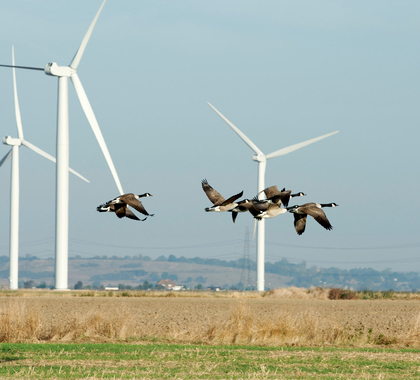Maine Gov. Paul LePage (R) signed an executive order imposing a de facto moratorium on permits for new wind turbines in western and coastal areas of the states.
The moratorium will remain in place at least until the newly created Maine Wind Energy Advisory Commission conducts a study on the economic impact of wind farms on the state.
LePage’s January 24 order is the latest in a series of moratoria in states across the nation concerned about the potential effects of wind turbines on human health, national security, and tourism.
LePage has long criticized wind energy for raising consumer electricity costs and being too reliant on government subsidies. As an alternative to new wind and solar installations in Maine, LePage supported importing less expensive existing hydropower from Quebec, Canada.
In response to LePage’s opposition, Norwegian energy company Statoil canceled a planned wind farm off the Maine coast in 2013. The moratorium puts a proposed experimental floating wind farm near Monhegan Island, the Maine Aqua Ventus project, on hold.
Tourism Concern
Steve McGrath, director of the Governor’s Energy Office, told Environment & Climate News LePage is especially concerned new wind farms would harm tourism in Maine.
“I think the governor is very concerned about the tourism industry in the state,” said McGrath. “Geographically, we’re the largest state in New England, but our population of 1.3 million is relatively small and dispersed.
“We receive between 30 and 40 million tourists annually, who spend $6 billion dollars a year, almost equal to the entire state government budget of $7.3 billion,” McGrath said. “We want to make sure when we use wind energy that we aren’t disrupting our tourism industry.”
Sending ‘a Clear Signal’
Asked about the timing of the order—just one day before Massachusetts regulators were to announce winners of a bidding competition in which Maine-based companies competed to supply Massachusetts with wind energy—McGrath says LePage wished he could have made the announcement sooner
“We would have liked to release the news a week earlier, but it was certainly intended to send a clear signal about the governor’s intentions on how Maine’s natural resources ought to be used,” said McGrath.
Despite the moratorium, Maine’s renewable energy industry remains sizeable. In 2017, it produced more wind energy than the entire rest of the New England region combined, ranking 22nd nationally in installed generation capacity, according to the American Wind Energy Association. The state has an expedited permitting process for wind projects in rural areas, which LePage has criticized as shortsighted.
Rising Wind Resistance
Physicist John Droz, founder of the Alliance for Wise Energy Decisions, says Maine’s moratorium is by no means an isolated event.
“Maine’s moratorium is part of much bigger picture or wider movement,” said Droz. “What happened in Maine is a continuation of a broader movement of concerned citizens taking place in numerous communities across the country.
“Increasingly, citizens are raising objections to new wind turbines out of concern wind turbines can adversely affect the health of nearby citizens and reduce the value of their property,” Droz said, citing a 2011 study by the Institute for Noise Control Engineering. “Under pressure from a coalition of military interests and citizens groups, North Carolina approved an 18-month moratorium in 2017, with Tennessee announcing a similar moratorium and Texas ending tax incentives for wind energy projects near military airfields.”
Droz says industrial wind energy does not provide a net economic benefit for a community when one considers its health impacts, the cost of subsidies, and the effects on tourism.
“Wind developers try to sell new wind farms as an economic benefit for a community, but that’s unlikely to be true,” Droz said.
Stopping Developers’ Special Rights
In Maine, citizens groups opposed to wind turbine construction, such as the Moosehead Region Futures Committee, applauded the moratorium.
Chris O’Neil, a former state legislator and current member of the board of the Friends of Maine’s Mountains, a statewide nonprofit advocacy group which opposes new wind developments in Maine, said the moratorium should have happened sooner.
“From our perspective, the moratorium was much-needed and long overdue,” said O’Neil. “Maine passed the Maine Wind Energy Act establishing an expedited permitting process for wind energy projects ten years ago, with much haste and little diligence.
“The law was passed with good green intentions, but after ten years of experience with this new land use we have learned some hard lessons,” O’Neil said. “This law gave unprecedented special rights of development to wind developers, amounting to a rubber stamp on wind energy development, which experience has shown threatens Maine’s most valuable assets: its natural amenities and tourism industry.”
‘A Temporary Condition’
O’Neil says he is hesitant to claim victory because LePage’s action at most provides time to reconsider Maine’s previous unquestioning commitment to wind power.
“People might think the governor just shut down the wind energy industry, but he did not,” said O’Neil. “This is a temporary condition, and frankly [it] may not hold up in the courts.
“While this is a de facto moratorium, the governor did not call his action a moratorium, because there is technical way to adopt a moratorium delineated in statute, which LePage did not follow,” O’Neil said. “The governor’s executive order is a recognition a ten year old wind law needs to be revisited, and sends a powerful message to the industry an important conversation concerning the future of wind power in Maine has started.”
Matt Kelly ([email protected]) is a freelance journalist writing from Dallas, Texas.

